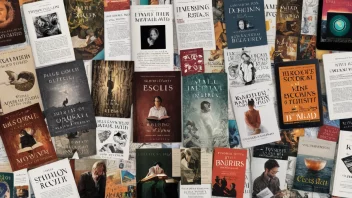Classic prose is often seen as daunting or inaccessible, but it holds a wealth of beauty and depth waiting to be discovered. To truly appreciate classic literature, one must approach it with an open mind and a willingness to engage with the text on multiple levels. Here are some strategies to help readers connect with the elegance of classic prose.
First, understanding the historical context in which a work was written can enhance appreciation. Authors like Jane Austen, Charles Dickens, and Leo Tolstoy were not only masters of language but also keen observers of the societal norms and struggles of their time. Reading a brief historical overview of the era can provide insight into the themes and characters, making the narrative more relatable and rich.
Next, take the time to savor the language. Classic prose is often celebrated for its lyrical quality and intricate sentence structures. Instead of rushing through the pages, pause to appreciate the author's choice of words, the rhythm of the sentences, and the imagery created in the mind's eye. For instance, when reading a passage from 'Pride and Prejudice,' notice how Austen's use of irony and wit not only develops character but also critiques her society's class structure.
Another enjoyable method is to engage with the text through discussions. Joining a book club or participating in online forums dedicated to classic literature allows readers to hear different perspectives and interpretations. This dialogue can illuminate aspects of the prose that may have gone unnoticed and deepen the overall reading experience.
Incorporating adaptations can also make classic prose more accessible. Many classic novels have been adapted into films, plays, and even modern retellings. Watching these adaptations can provide a visual context to the prose and spark interest in reading the original text. For example, seeing the vibrant world of 'The Great Gatsby' brought to life can enhance understanding of Fitzgerald's intricate language and themes of disillusionment.
Additionally, embracing the challenges of classic prose can lead to personal growth. Many classics are dense and require careful reading. Instead of viewing this as a barrier, approach it as an opportunity to develop critical thinking skills. Annotate the text, highlight passages that resonate, and jot down thoughts and questions in the margins. This active engagement can transform reading from a passive activity into an enriching experience.
Finally, remember that appreciation of classic prose is a journey rather than a destination. Not every classic will resonate the same way for every reader, and that's perfectly okay. Allow yourself to explore different authors and styles, and don’t hesitate to move on from a work that doesn’t capture your interest. Literature, especially classics, is meant to be enjoyed, and the right book will ultimately find its way into your heart.
In conclusion, appreciating the beauty of classic prose requires patience, context, and a willingness to engage. By taking the time to understand the historical backdrop, savor the language, engage in discussions, explore adaptations, and actively annotate, readers can unlock the timeless beauty and relevance of classic literature. Embrace the challenge, and you may find a new love for the written word that transcends time.
Unlocking the Beauty of Classic Prose
Discover how to appreciate the beauty and depth of classic prose through engagement and understanding.






